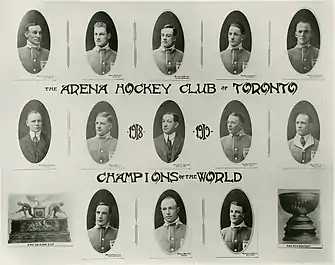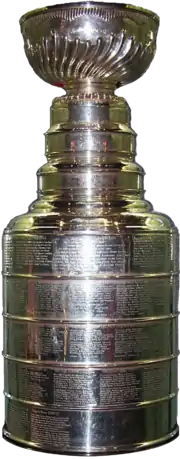1918 Stanley Cup Finals
The 1918 Stanley Cup Finals was contested by the National Hockey League (NHL) champion Toronto and the Pacific Coast Hockey Association (PCHA) champion Vancouver Millionaires. In a series held entirely in Toronto, the Toronto team won the series by three games to two in the best-of-five game series to win the Stanley Cup. It was the first series contested by the new NHL and subsequently the first Stanley Cup win by the Toronto NHL franchise team.
| 1918 Stanley Cup Finals | ||||||||||||||||||||||
|---|---|---|---|---|---|---|---|---|---|---|---|---|---|---|---|---|---|---|---|---|---|---|
| ||||||||||||||||||||||
| Location(s) | Toronto: Arena Gardens | |||||||||||||||||||||
| Format | best-of-five | |||||||||||||||||||||
| Coaches | Toronto: Dick Carroll Vancouver: Frank Patrick | |||||||||||||||||||||
| Dates | March 20 – 30 | |||||||||||||||||||||
| Series-winning goal | Corb Denneny (10:30, third) | |||||||||||||||||||||
Paths to the Finals
Prior to the 1917–18 season, the National Hockey Association (NHA) had suspended operations as the result of a power play to oust Toronto Blueshirts owner Eddie Livingstone. The remaining clubs then met in November 1918 to form the NHL, using the same constitution and playing rules of the NHA. The NHL took the NHA's place in competing for the Cup in a playoff series with the Pacific Coast Hockey Association.
The Toronto NHL players were assigned from the Toronto NHA franchise, and played for a 'temporary' Toronto NHL franchise, operated by the Toronto Arena owners. This is why it is often called the 'Arenas' although no hockey club with the official name "Arenas" existed until after the 1917–18 season. The team at the time used no nickname; and it was often referred to at the time as the "Blueshirts', the nickname of the NHA franchise, as it was announced by the NHA that the franchise had been sold, although this had not been agreed to by Eddie Livingstone, who wanted to resume his franchise, or be compensated under his terms.[1]
Despite this black cloud over it, Toronto won the second half of the split regular season, while the Montreal Canadiens won the first half. Toronto then won the NHL title by defeating the Canadiens in a two-game, total-goals series, 10–7.
Meanwhile, Vancouver finished the 1917–18 PCHA regular season in second place with a 9–9 record behind the 11–7 Seattle Metropolitans. However, Vancouver beat Seattle in that league's two-game, total-goals finals, 3–1, with a 1–0 game two victory.
Game summaries
As with the three previous NHA-PCHA Cup Final series, the series alternated between the NHL champion and the PCHA champion each year, while the differing rules for the leagues alternated each game. This meant that all of the games for the 1918 championship series were played at Toronto's Arena Gardens.
Two of the major differences between the two leagues' rules proved to be a major factor in the series. The PCHA allowed forward passing (adopted in the 1913–14 season) and played with seven players per side; the NHL did not adopt forward passing until the following season, and only played with six players. In every game, the winner was the one playing under its league's rules. The Torontos won Games 1 and 3 with victories of 5–3 and 6–3, and the Millionaires recorded 6–4 and 8–1 wins in Games 2 and 4. Because game five was played under NHL rules, it helped Toronto's Corbett Denneny to score the series winning goal in a 2–1 victory. The Torontos outscored the Millionaires by a combined total of 13–7 in the three games played under NHL rules. Conversely, Vancouver recorded a 14–5 margin in the games under PCHA rules.
Toronto goaltender Hap Holmes recorded a 4.20 goals-against average during the series, while Alf Skinner led Toronto with eight goals. Cyclone Taylor scored nine goals for Vancouver.
| March 20 | Vancouver Millionaires | 3–5 | Toronto Arenas | Mutual Street Arena | Recap | |||
| 16:00 – Cyclone Taylor (1) 17:00 – Cyclone Taylor (2) |
First period | Reg Noble (2) – 08:00 Harry Meeking (4) – 10:00 Reg Noble (3) – 11:00 Alf Skinner (1) – 19:50 | ||||||
| 10:00 – Mickey MacKay (1) | Second period | Alf Skinner (2) – 13:00 | ||||||
| No scoring | Third period | No scoring | ||||||
| Hugh Lehman | Goalie stats | Hap Holmes | ||||||
| March 23 | Toronto Arenas | 4–6 | Vancouver Millionaires | Mutual Street Arena | Recap | |||
| Alf Skinner (3) – 17:00 | First period | 18:00 – Cyclone Taylor (3) | ||||||
| Harry Cameron (2) 16:00 | Second period | 02:00 – Cyclone Taylor (4) 06:00 – Mickey MacKay (2) 14:00 – Mickey MacKay (3) | ||||||
| Alf Skinner (4) – 08:00 Alf Skinner (5) – 16:00 |
Third period | 06:00 – Si Griffis (1) 10:00 – Mickey MacKay (3) | ||||||
| Hap Holmes | Goalie stats | Hugh Lehman | ||||||
| March 26 | Vancouver Millionaires | 3–6 | Toronto Arenas | Mutual Street Arena | Recap | |||
| No scoring | First period | 05:00 – Harry Cameron (3) 08:00 – Alf Skinner (6) 13:00 – Corb Denneny (1) | ||||||
| Ran McDonald (1) – pp – 06:00 Cyclone Taylor (5) – 16:00 |
Second period | 11:00 – Harry Cameron (4) 14:00 – Corb Denneny (2) | ||||||
| Cyclone Taylor (6) – 03:00 | Third period | 13:00 – Alf Skinner (7) | ||||||
| Hugh Lehman | Goalie stats | Hap Holmes | ||||||
| March 28 | Toronto Arenas | 1–8 | Vancouver Millionaires | Mutual Street Arena | Recap | |||
| No scoring | First period | 05:00 – Cyclone Taylor (7) | ||||||
| Ken Randall (1) – 04:26 | Second period | 04:00 – Barney Stanley (1) 11:06 – Mickey MacKay (5) 13:06 – Barney Stanley (2) | ||||||
| No scoring | Third period | 06:00 – Cyclone Taylor (8) 13:00 – pp – Lloyd Cook (1) 13:45 – pp – Ran MacDonald (2) 15:00 – pp – Lloyd Cook (2) | ||||||
| Hap Holmes | Goalie stats | Hugh Lehman | ||||||
| March 30 | Vancouver Millionaires | 1–2 | Toronto Arenas | Mutual Street Arena | Recap | |||
| No scoring | First period | No scoring | ||||||
| No scoring | Second period | No scoring | ||||||
| Cyclone Taylor (9) – 09:30 | Third period | 00:30 – Alf Skinner (8) 10:30 – Corb Denneny (3) | ||||||
| Hugh Lehman | Goalie stats | Hap Holmes | ||||||
| Toronto won series 3–2 | |
Player stats
| Toronto | GP | G | A | PTS | PIM |
|---|---|---|---|---|---|
| Alf Skinner | 5 | 8 | 2 | 10 | 18 |
| Harry Mummery | 5 | 0 | 6 | 6 | 21 |
| Harry Cameron | 5 | 3 | 1 | 4 | 12 |
| Corb Denneny | 5 | 3 | 1 | 4 | 0 |
| Reg Noble | 5 | 2 | 1 | 3 | 12 |
| Harry Meeking | 5 | 1 | 2 | 3 | 18 |
| Ken Randall | 5 | 1 | 0 | 1 | 21 |
| Goaltender | GP | W | L | Min | GA | SO | Avg |
|---|---|---|---|---|---|---|---|
| Hap Holmes | 5 | 3 | 2 | 300 | 21 | 0 | 4.20 |
| Vancouver | GP | G | A | PTS | PIM |
|---|---|---|---|---|---|
| Mickey MacKay | 5 | 5 | 5 | 10 | 12 |
| Cyclone Taylor | 5 | 9 | 0 | 9 | 15 |
| Ran MacDonald | 5 | 2 | 2 | 4 | 9 |
| Lloyd Cook | 5 | 2 | 0 | 2 | 12 |
| Barney Stanley | 5 | 2 | 0 | 2 | 6 |
| Si Griffis | 5 | 1 | 0 | 1 | 9 |
| Leo Cook | 5 | 0 | 0 | 0 | 6 |
| Speed Moynes | 5 | 0 | 0 | 0 | 6 |
| Goaltender | GP | W | L | Min | GA | SO | Avg |
|---|---|---|---|---|---|---|---|
| Hugh Lehman | 5 | 2 | 3 | 300 | 18 | 0 | 3.60 |
Stanley Cup engraving
The 1918 Stanley Cup was presented by the trophy's trustee William Foran. The Arenas never did engrave their name on the Cup for their championship season.
It was not until the trophy was redesigned in 1948 that the words "1918 Toronto Arenas" was put onto its then-new collar.
The following Arenas players and staff were eligible to have their names engraved on the Stanley Cup

1918 Toronto Arenas
Players
- 4 Reg Noble‡
- 5 Corb Denneny
- 9 Jack Adams
- 6 Alf Skinner
- 8 Rusty Crawford
- 7 Jack Coughlin†
- 10 Harry Meeking
- 12 Jack Marks†
- 2 Harry Cameron
- 3 Ken Randall‡ (captain)
- 11-7 Harry Mummery
- 31-1 Harry Hap Holmes
Coaching and administrative staff
- Charlie Querrie (President/Manager), Dick Carroll (Coach)
- Frank Carroll (Trainer)
‡ Played rover position in the Stanley Cup Finals
† Missing from team picture.
Stanley Cup engraving
Although the Vancouver team was not the winner of the series, the Vancouver club had the words "Vancouver/Defeated Seattle/1917–18/Score 1–0" engraved on the Cup after winning the PCHA championship over the Metropolitans, who won the previous year's Cup finals. This was consistent with the practice at that time of the trophy being officially passed on to the winner of the league championship of the previous Cup champion's league.
The Toronto club never did engrave their name on the Cup to memorialize their series victory over Vancouver. At the time, the NHL club was in a dispute with the owner of the NHA Toronto franchise holder over the Stanley Cup revenues. In 1948, the NHL engraved "1918 Toronto Arenas" on the Cup.
Dick Carroll was not only the first NHL coach to win the Stanley Cup in his first NHL season, Carroll was also a rookie coach.
See also
References
- Holzman, Morey (2002). Deceptions and Doublecross.
- "1917–18 Stanley Cup Winner: Toronto Arenas". Hockey Hall of Fame. Retrieved 2010-10-16.
- "hockeyleaguehistory.com – Pacific Coast Hockey Association". Archived from the original on 3 July 2006. Retrieved 2006-07-03.
- "All-Time NHL Results".
- Podnieks, Andrew; Hockey Hall of Fame (2004). Lord Stanley's Cup. Triumph Books. pp. 12, 50. ISBN 1-55168-261-3.
- Dan Diamond, ed. (1992). The Official National Hockey League Stanley Cup Centennial Book. Firefly Books. pp. 49–50. ISBN 1-895565-15-4.
| Preceded by Seattle Metropolitans 1917 |
Toronto Stanley Cup Champions 1918 |
Succeeded by (No Champion for 1919) |
